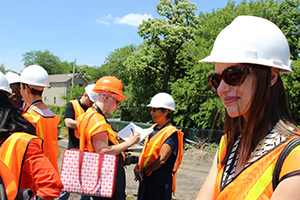
‘Doable City’ forum focuses on practical ways of making communities more livable
The first day of Doable Cities included a neighborhood walkability tour. Photos: Emily Munroe.
Innovation can be a lonely task. But not this week in Chicago, where more than 150 civic innovators are gathering for the “8-80 Cities Forum: The Doable City” through Wednesday.
“Doable doesn’t mean easy. It means possible,” said urban expert Gil Penalosa, executive director of 8-80 Cities.
Participants, including artists, city planners, community activists, community foundation executives, mayors, parks officials, philanthropists and traffic engineers, are meeting to exchange practical experiences on what works—and doesn’t—to make cities more livable.
But during the opening session Monday afternoon, there was a palpable sense of building a movement, by connecting those who are trying to re-center cities around human needs—including the need to engage in various ways.
“There is nothing easy about city-building, because people don’t believe what they can’t yet see,” said Carol Coletta, vice president for community and national initiatives at Knight Foundation, which supported the forum. “Our cities deserve bold ideas from civic innovators defying the conventional wisdom.”
Some of the bold ideas the participants will share during the forum workshops, keynotes and social session will seem small, such as shutting down streets on a given day for bicycles and pedestrians, or picnicking in parking places. But there is a point to those; they are practical initiatives that prompt people to think differently about their environment.

Others get bigger: permanent walking streets in Copenhagen, the “sexy, lipstick red” bus rapid transit vehicles that Bogotá, Colombia, adopted, and the three-tier highway that the mayor of Seoul, South Korea, dismantled to liberate the stream that originally ran through the city. As author Charles Montgomery told the group, measuring factors in a city that make people happy provides different outcomes then measuring traffic flow.
Montgomery also noted that developers in the first half of the 20th century built what are now some of the most attractive neighborhoods in the country because the homes were a short walk to shopping, schools and parks. The post-World War II explosion of the suburbs followed, making cities and suburbs alike slaves to the automobile. With the United States set to add 100 million more residents in the next 40 years, building out the suburbs further is “just not sustainable,” Penalosa said.
All eight cities where Knight Foundation has a permanent local presence sent delegations to the forum, sometimes including civic changemakers from elsewhere in their states. Eleven more communities where Knight works closely with the local community foundation also sent delegations.
They represent a range of civic innovation experience, having been involved in projects such as the Gold Line streetcar in Charlotte, N.C.; Macon, Ga.’s College Hill Corridor; Miami’s startup ecosystem; and St. Paul, Minn.’s new light-rail Green Line. Knight believes healthy democracy relies on communities that are informed and engaged, and opportunities that give people more chances to meet and exchange experiences and ideas.
Andrew Sherry is vice president of communications at Knight Foundation.
Recent Content
-
Communitiesarticle ·
-
Communitiesarticle ·
-
Communitiesarticle ·


